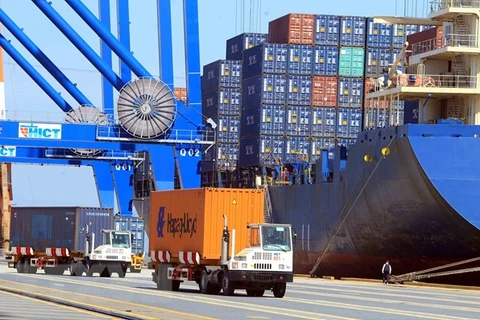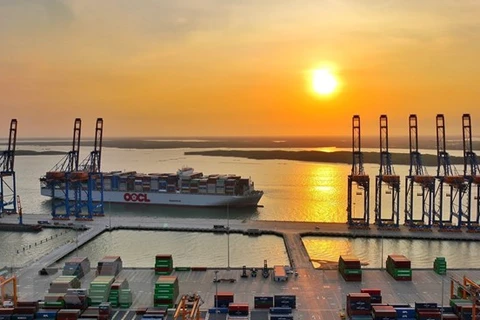 Loading and unloading of containers at a seaport of Vietnam Maritime Corporation. (Photo: Vietnamplus)
Loading and unloading of containers at a seaport of Vietnam Maritime Corporation. (Photo: Vietnamplus) Hanoi (VNA) - Despite numerous difficulties and challenges in 2024, the Vietnam Maritime Corporation (VIMC) remains determined to maintain its market share and customer base, focusing on developing deep-water ports and container fleets.
Additionally, the company will continue to strengthen training activities and human resource development to achieve its production and business plans.
VIMC General Director Nguyen Canh Tinh made the remark at the year-end review conference for 2023 and the rollout of the 2024 plan held on January 4.
Fierce battle in maritime market
Tinh said the maritime transport market is expected to continue facing difficulties and challenges. The situation remains tense due to ongoing conflicts escalating in various regions, global supply chain disruptions and a continued strong growth in ship supply, among others.
Shipping companies are compelled to significantly cut operating costs, leading to difficulties in negotiating service prices between ports and shipping companies.
On the other hand, the VIMC fleet is mostly old (with an average vessel age of 20 years), technologically inferior, lacking uniformity, and the fleet size is narrowing due to the restructuring process and complications in investment procedure regulations. For several years, VIMC enterprises have faced challenges in developing their fleet.
VIMC has set production and business plans with a maritime transport volume of 15.8 million tonnes (76% of the 2023 target); a seaport cargo volume of 123.7 million tonnes (up 109% of the target for 2023); revenue of 17,742 billion VND or 722.5 million USD (reaching 99% compared to 2023), and a profit of 2,169 billion VND or 88.3 million USD (fulfilling 104%, higher than in 2023).
Tinh said the maritime market in 2024 remains challenging, with fierce competition resembling a battle due to the market's reduced purchasing power.
 Nguyen Canh Tinh, General Director of VIMC, states that the Corporation has achieved the highest level of the set targets. (Photo: Vietnamplus)
Nguyen Canh Tinh, General Director of VIMC, states that the Corporation has achieved the highest level of the set targets. (Photo: Vietnamplus) In the coming time, VIMC will develop its container fleet, seaports, energy projects, digital and technology transformation. The company will build a modern seaport system that ensures compliance with regulations and standards, aiming for sustainable growth and development.
The corporation will continue to intensify the restructuring of production and business units, financial restructuring, and fleet restructuring. It will vigorously implement cost-effective cost management programmes to enhance productivity, quality, efficiency, and the competitiveness of its member enterprises.
Prioritizing investment in seaports
Deputy Chairman of the Deputy Chairman of Committee for state capital management at enterprises Nguyen Ngoc Canh noted that VIMC boldly seize the right moment to invest in the international maritime transport fleet to optimize State investment capital.
Pointing out that 2024 brings both challenges and opportunities, Canh suggested that VIMC focus on investing in berths 3 and 4 at Lach Huyen Port, investing in Da Nang Port, studying the construction plan for Lien Chieu Port, and the International Transshipment Port project in Can Gio district, Ho Chi Minh City.
He urged VIMC to continue developing seaports as a core role, with maritime transport serving as a connecting link while improving the supply chain of services for customers.
He noted that there should be a focus on investing in digital transformation to enhance operational and managerial efficiency. Additionally, it's important to review inefficient investments, closely monitor the effectiveness of production and business, and consider divesting from non-core businesses of the Corporation to preserve capital and improve capital efficiency.
 Nguyen Ngoc Canh, Deputy Chairman of Committee for state capital management at enterprises, presents commendation flags to VIMC units that have achieved outstanding results in production and business. (Photo: Vietnamplus)
Nguyen Ngoc Canh, Deputy Chairman of Committee for state capital management at enterprises, presents commendation flags to VIMC units that have achieved outstanding results in production and business. (Photo: Vietnamplus) VIMC's report shows that the volume of maritime transport in 2023 reached 20.6 million tonnes (116% of the 2023 plan), cargo volume through ports reached 113.5 million tonnes (84% of the 2023 plan), revenue of 17,964 billion VND or 731.5 million USD (91% compared to 2022 and 104% of the 2023 plan), and profit of 2,084 billion VND or 84.8 million USD (90% of the 2023 plan)./.






















